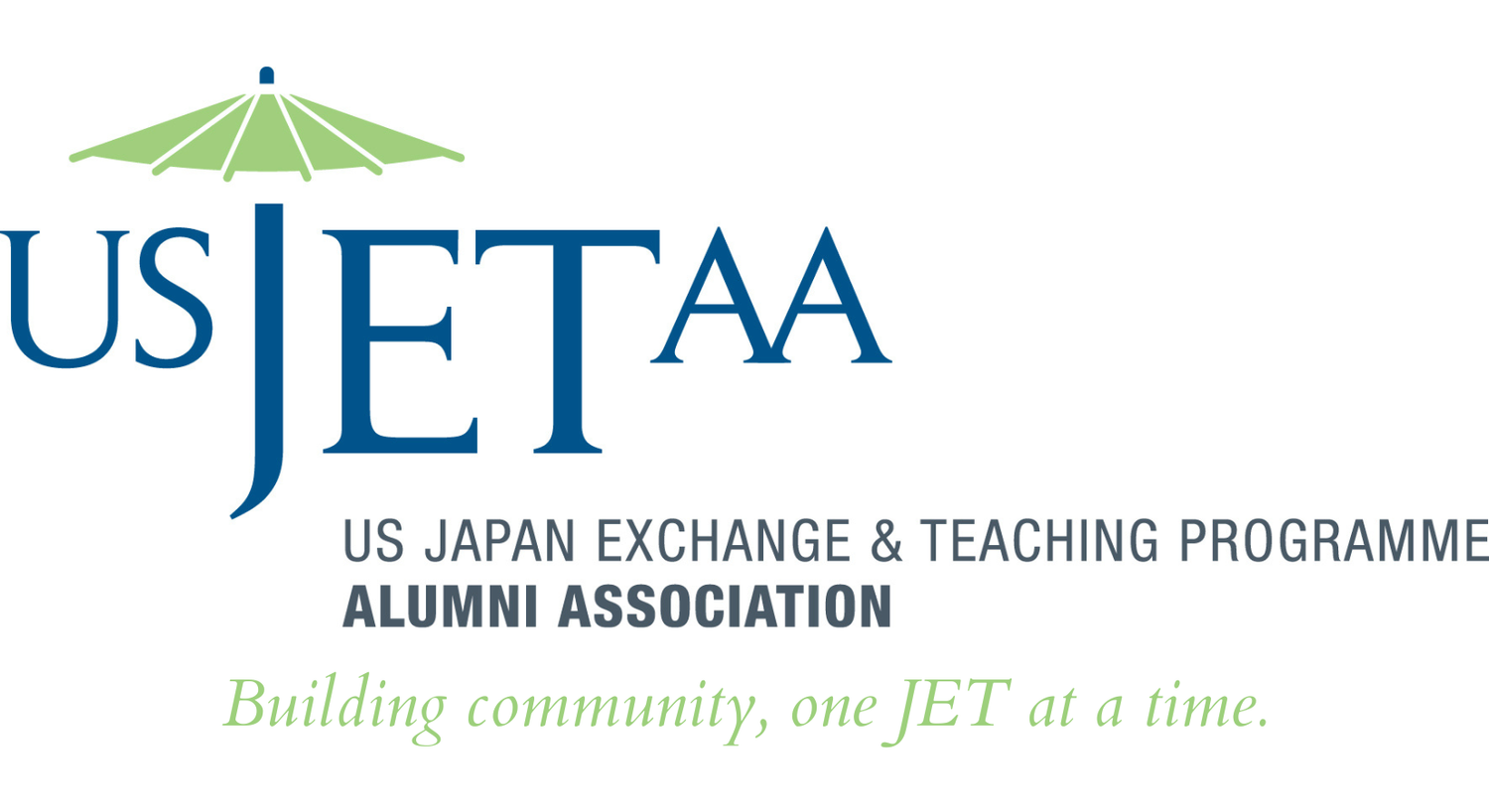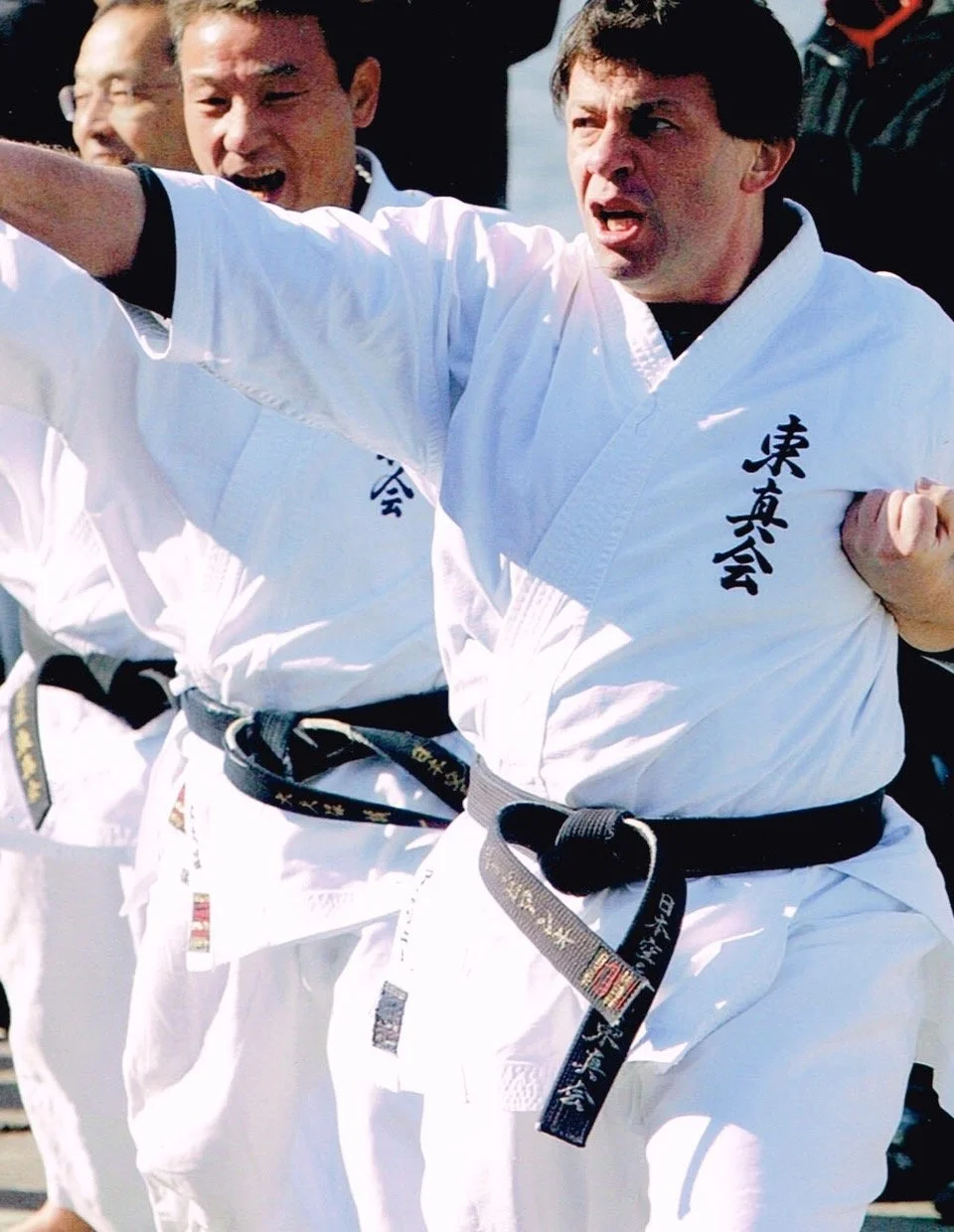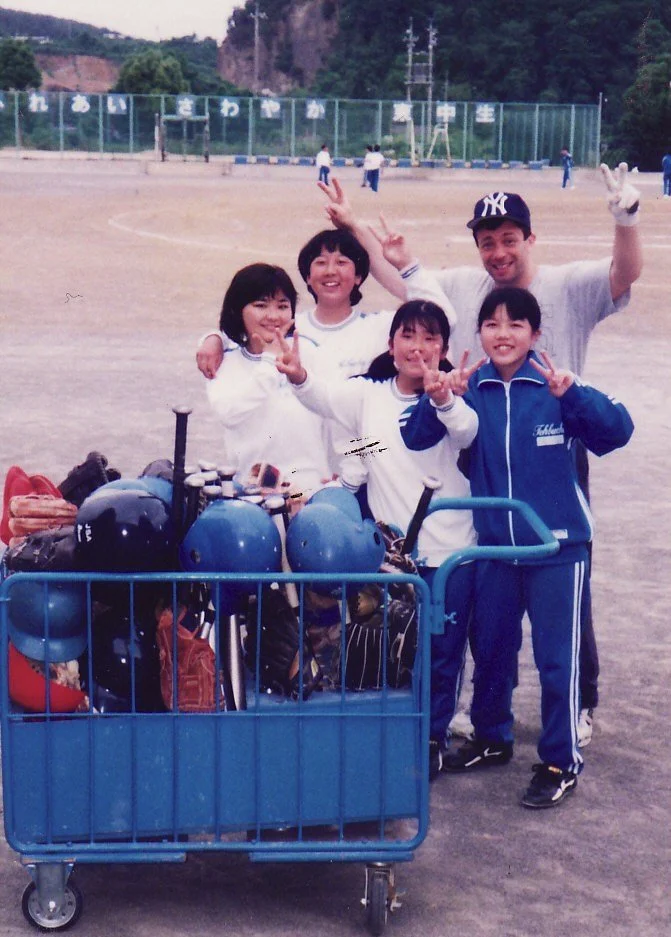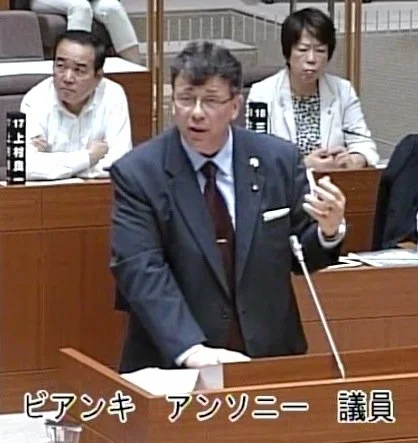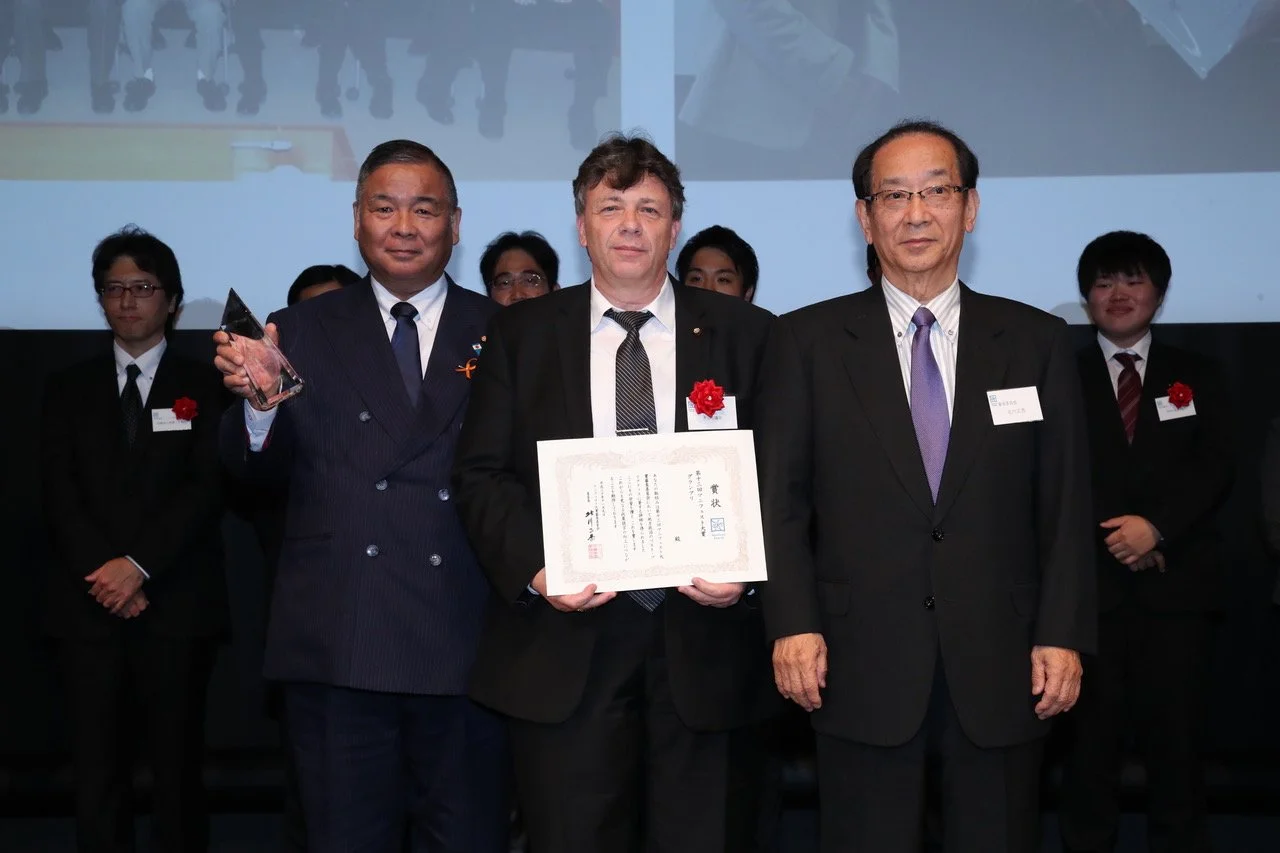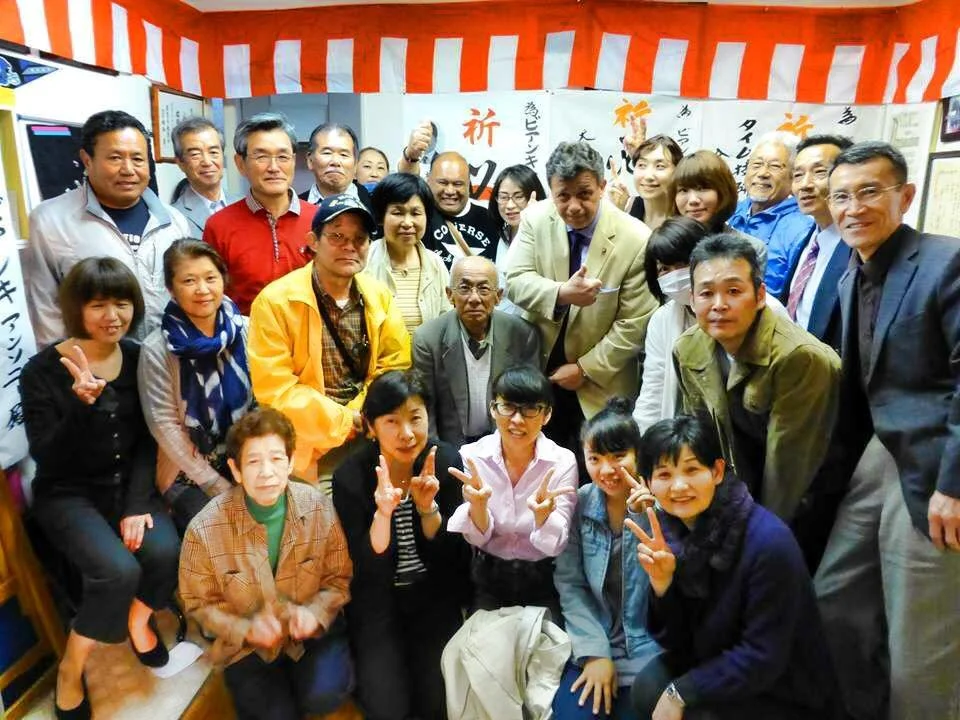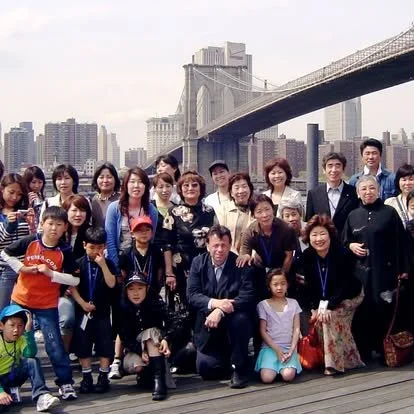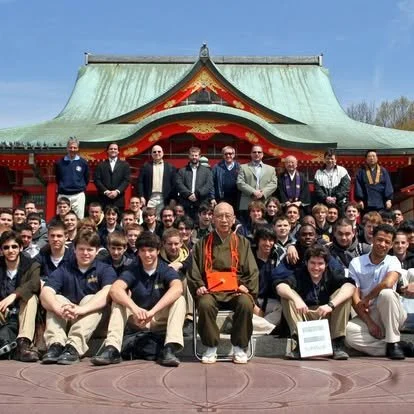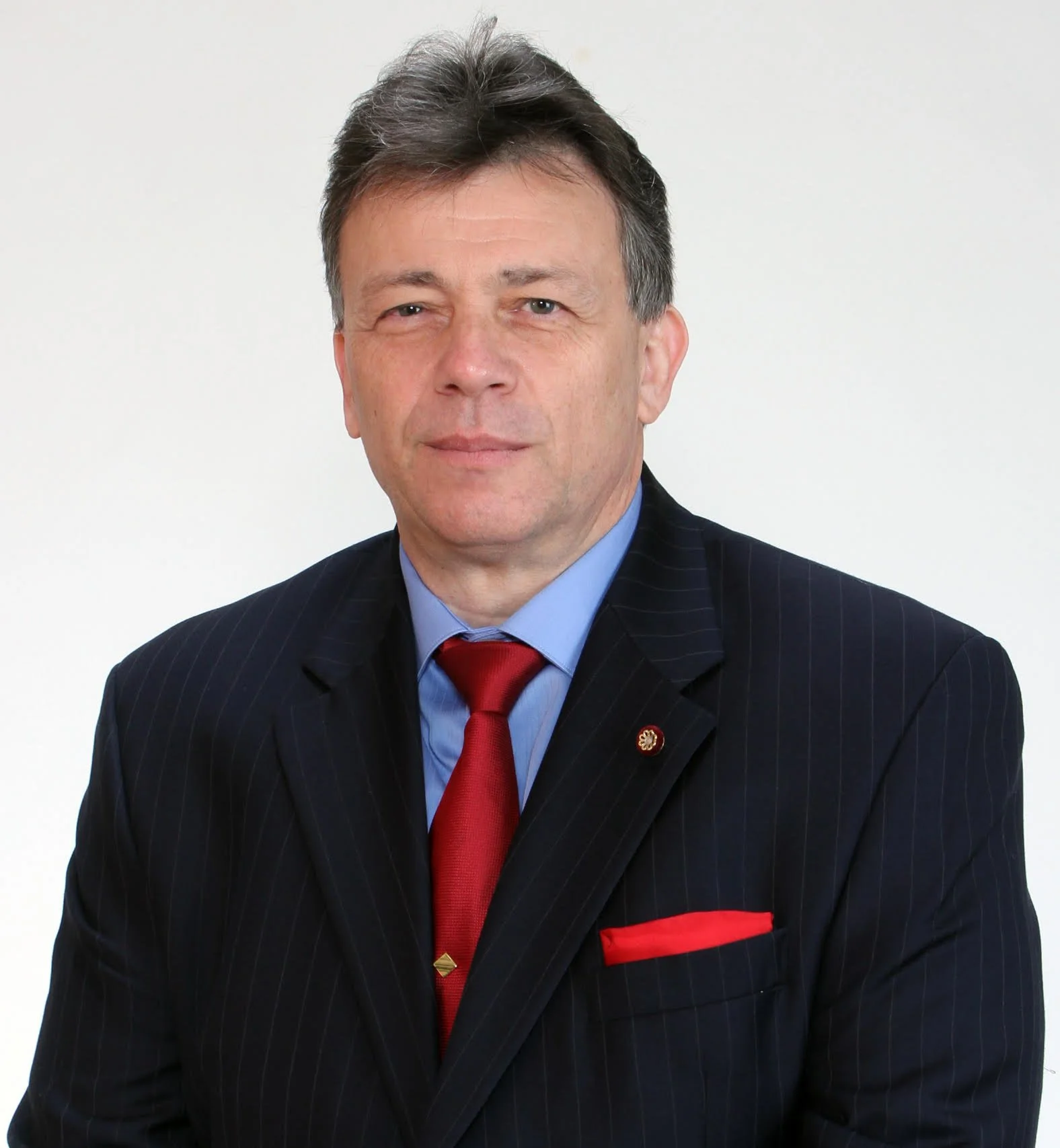Anthony Bianchi: The Councilman Inspiring Change in Inuyama
Anthony Bianchi (Aichi, 1989-1991)
Inuyama City Former Councillor and Chairman (2003-2023)
Founder of B-Bridges International Exchange
Advisor to the Inuyama International Exchange Association
Interviewed by Bobby Nawbary (Aomori, 2024-present)
Anthony Bianchi is the first American-born person to hold public office in Japan. In 2003 he was elected to the Inuyama City Council winning the most votes in history. This unpredictable and surprising event was a culmination of his devotion to community, empathetic nature and his staunch, stubborn sense of justice.
Speaking to Anthony, he isn't what you would expect a politician to be. He is more familiar than that, like a friend you've known for years. Anthony's life has been about celebrating community because it was the only way he could be himself.
You have a complex background… being from New York, specifically Brooklyn and having strong Italian heritage lends itself to a few stereotypes. For better or worse, as an elected official something people will always question are your morals and values. How do you feel those led you to embrace Japan and its people successfully?
“Well, it's true. Being an Italian American in New York does lend itself to some assumptions. Whether it's the mafia or New Yorkers being, let's say…straight forward…but I think there are aspects of both that mean a lot. Family, community and history are all very important to the way I was brought up. Where I grew up people knew each other like brothers and sisters, generations of immigrants settled down there. Japan also keeps history relevant, local customs and a community of people devoted to preserving it…”
Growing up in Brooklyn and the whirlwind that was New York in the 60s and 70s developed a kind of grit and scrappiness in Anthony that would help him survive and advocate for himself throughout his life.
At that time New York was a door to the world. The smell of Italian and other ethnic bakeries next to a sea of people pouring into unquenchable subway entrances, a respite among the traffic and burning cigarettes. The abundance of culture and opportunity stirred into chaotic cacophony within daily life was palpable. Anthony was trying to make things happen as a young man in New York juggling a hodgepodge of jobs. However he was in between two worlds and he was seeing his own neighborhood change to something less recognizable as time went on.
“I could see the Italian Americans, in the younger generations, slowly moving physically and mentally away from both the neighborhood and values I was raised with. You can see it in the way they acted compared to the older generations. Things were changing, and the place where I grew up was not the same. Even as I was getting ready to move to LA after studying film at NYU.”
Anthony's mind wandered and thought about possibilities beyond Brooklyn.
How did the idea of Japan come into your life? What influenced you to go to Japan?
Anthony practicing karate. (photo courtesy of Bianchi)
“Now at this point I had gotten my foot in the door in the film industry. I was working in LA on some well known shows - the last being The Jeffersons. I like to say that, 'I clawed my way to the bottom.' At NYU I got to see Japanese culture through studying film. Kurosawa, Miyazaki. Anyway, eventually, the show I was working on was cancelled - it wasn’t my fault - and there was no more work. I was really burnt out too, working in film is exhausting. I went back to New York to center myself and to find out what was next for me.”
This time away from the chaos of the film industry opened Anthony’s mind to possibilities of exploring Japanese culture. It was during this time where he gained a deep appreciation for Zen Buddishm and martial arts in the form of karate.
“Zen Buddhism and martial arts were really working for me. As a little bit of an emotional person, I had found some things that really helped me. I wanted to experience more of it. If I were to ever visit Japan, now was a good time to go.”
His first experience in Japan was through a brief homestay program during the Design-Haku 1989 in Aichi. It was here Anthony deepened his appreciation for not only Japanese culture but specifically the local culture. Narrow streets became full during cultural holidays, old and young people worked year-round together to celebrate history, family and most importantly, community. Anthony's host mother was working as an English teacher and told him about the JET Program. Anthony was curious what a full year in Japan would do for him. He would go back to the US and apply to the JET Program which would have him return to the Aichi area.
What was your JET experience like? How did you manage to get placed back in Aichi?
Anthony with students while on JET. (photo courtesy of Bianchi)
“Well first of all, I knew some people and I requested to go back there. Not many people, especially at that time, were requesting Aichi. Most people were requesting Tokyo, Kyoto you know… So they posted me there as a one shot . I was traveling to a different school every day.”
Anthony's JET experience flew by. Two years felt like a few weeks, but he wasn't quite ready to leave Japan. Anthony would work in the historical town of Kiyoso for two years after his contract, and from there he began to question his life's trajectory. JETs can relate to the uncertainty of being on yearly contracts and seeing the years pass feeling a bit disconnected from the realities of the life they are used to at home.
“By that time, I was a bit older than most JETs and my future wasn't looking so sure. I decided to go back to New York, I had a friend in the Foreign Service. I figured I would try to do that too and took the test. I passed the written test but…the interview…Let's say I'm a bit too rough around the edges. Imagine My Cousin Vinny, as a diplomat. “Aha mannagia, wattsa madda wit youz guys?!” I was probably going to start a war by accident.
Anthony was sensitive to Japanese sensibilities, but was a straight shooter when it came to things with which he could not agree. His direct style of communication was unusual, particularly in Japan where indirectness and layers of social etiquette are ubiquitous. But, upon returning to Japan, Anthony's candidness and directness would prove to be one of his greatest assets.
At this point your life seems like trying to fit a square peg into a round hole, I think there's a Japanese equivalent to that saying too… How did Inuyama come into the picture?
Anthony’s first election poster (photo courtesy of Bianchi)
“A teacher with whom I worked on JET introduced me to Inuyama’s representative to Aichi Prefecture on my first tour in Japan. He later became mayor of Inuyama while I was looking for a way to get back to Japan. After contacting him, he tried getting me a job working with the city’s international division. But that didn't pan out. There was a lot of pushback for hiring a foreigner as a regular city employee. So he asked me to work at the board of education. That turned out to be a good opportunity. They had been using a rent an AET company. So I said, 'Let me help you with recruiting.'”
Anthony realized that there was a way he could help the city beyond teaching English. Anthony started the Inuyama Native English Teacher Program (NET), a teacher recruitment program that hired highly qualified English teachers, one for each of the city’s four junior high schools. It was a hectic time for him, dealing with the board of education, the city government, learning Japanese on the fly, managing staff and teaching duties as well as mediating when issues arose.
“I did that for eight years. In fact, two of the teachers I hired in my first few years in Inuyama are still teaching here today, some 20 odd years later. But it was just frustrating for me. There was empirical evidence that the students were doing better, yet the Board of Education was refusing to take necessary steps to insure the continuing quality of the program. It got to the point where the differences with the city government became irreconcilable.”
Anthony wasn't the only one who didn't see eye to eye on some of the local government policies at the time. Through his conversations with the locals over the years, he felt like it was time to attempt to change things for the better including areas other than education. Anthony decided to run for city councilman.
That seems like a big jump, from an English teacher to a politician in a foreign country. Maybe it's the way your personality is wired but I don’t think most people would decide to do that….
Anthony making an argument at a council session. (photo courtesy of Bianchi)
“Yeah I know, right? It sounds crazy looking back at it. But I hate to give up. I’m a hard-headed guy. If I just left like that I would have felt like I just gave in. I also knew that I needed a new platform. I thought, if I run, present my case and lose, that is the people's choice. That would be fine, at least I didn’t give up.”
Anthony received the most votes in the history of the election. The overwhelming amount of support for him was the fruit of his dedication to his students and local community. By this time, his students had grown up with him and were now eligible to vote. Anthony would soon be struggling to stay afloat in a tidal wave of obscure kanji, senmonyougo (official jargon) and paperwork.
“There was one thing I was afraid of. It was all the reading I would have to do. Some politicians just want the fancy title and badge, then just rubber stamp anything that comes from the administration. I didn't want to do that, I wanted to understand everything said in the law and the documents regarding policy to make judgments.”
He sometimes had to prove he belonged and had the requisite near-perfect Japanese language skills. Anthony shared a story that illustrated both these demands.
Bianchi receiving a Manifesto Award. (photo courtesy of Bianchi)
“I was doing a question and answer at a council session, when the city official exclaimed 'Do you even understand what I am saying?!' in the middle of his speech. I just said, in the local dialect, “Wakatoru!“ (I understand!)....that got some reactions, everybody started laughing.”
The kid from the streets of Brooklyn would later become the Chairman, and the Inuyama City Council would be recognized for reforms he instituted, recieving both the prestigious Manifesto Grand Prize Jury Special Award and the Manifesto Grand Prize Grand Prix Award.
JETs can learn from Anthony's perseverance. Whether you are standing in front of a classroom for the first time or in front of a city council, a focus on the larger goal of helping people can keep you going and help you overcome any obstacles you may find in front of you.
What do you think contributed to those awards and was there anything in particular you feel you did to change the culture in Inuyama?
Election HQ just after being re-elected. (photo courtesy of Bianchi)
“I decided to start a forum where the citizens could have a voice. Seems like in every democracy you have a place where people can go and be heard by their local representatives, but not in Japan. I instituted a simple program called the “Inuyama Citizen Free Speech Program”. Citizens could come to the council chamber and address the full council about any topic concerning the city. That shook up things quite a bit.”
Anthony wanted to show people that the government was accessible and if he could change things, anyone could. He wanted to get more people involved that were not simply ushered into politics because of their family's name or reputation. Anthony's goal was to be a voice for the people and to give the people of Inuyama a platform to speak for themselves. Inuyama was changing, much to the chagrin of some of his fellow councilmen and others in the city government. For 20 years, or five terms, Anthony continually endeavored to implement positive change, even when faced with challenges along the way.
Japanese B-Bridges participants in NYC. (photo courtesy of Bianchi)
What is the B-Bridges Exchange Program? How did that come to be?
With the help of his wife and sister-in-law, Anthony would go on to start the B-Bridges Exchange Program, a transformative experience for both students in the US and the host families of Inuyama. The program brought high school music bands to Inuyama to perform and participate in a homestay.
“We've been doing this for twenty years now. The day I was elected, I got an email from the Brooklyn Borough President, Marty Markowitz. I thought it was a joke, my friends messing around! They proposed a reception for me, to celebrate my election win. There I met the President of Xaverian, my old high school. We decided to start an exchange program. We had 50 high school kids from the school’s jazz band come to Inuyama. We were doing a lot…plane tickets, planning trips and concerts, and assorted paperwork. Then I thought…Let's have the host families go to New York!”
“We have since heard that entire host families have attended weddings of former exchange students in New York, and that many of the exchange students still return to Japan to visit their host families. The homestay families and students became like a real family, that is what it is all about.”
The program helped in strengthening US-Japan relations and has had a long lasting impact on all those involved.
American B-Bridges participants in Japan. (photo courtesy of Bianchi)
You're the first ever to do this, an American-born Japanese councilman. Do you feel like you're a part of history?
“Well, that sounds kinda sounds like a big deal, but when I was actually doing it I never thought much about it. It's a serious job and I have to listen to and work for the people.”
Anthony's direct style of communication, and more importantly his devotion to the citizens, were important to his success as a councilman and chairman. His multiple successful initiatives are a testament to that.
“I tried to curb myself a bit, not to say what I thought as an American, but to say exactly what citizens were telling me. The things they couldn’t, or weren't in a position to say themselves. I was just trying to give people a voice. Sometimes people are treated like pawns in this hierarchical society. I hate seeing people treated that way, it makes me want to fight.”
Where is home for Anthony? At this point you're essentially Japanese, but you clearly still have a strong connection to your past and heritage.
“I'll start out and say, everyone should have pride in what their background is and where they are from. That doesn't mean you are better than anyone else though. I was always proud to be from Brooklyn. This accent, there's no hiding it! As I am finishing this part of my life, I think about my neighborhood…just when you think some things never change, they do. The old neighborhood isn’t there anymore, however I still have family in New York that I am close to. Since I can't really go back to the neighborhood anymore, I thought why not go check out Italy… I went and I felt like I was back in the Brooklyn I grew up in. When I go there, the neighborhood people say ‘Ciao Entony!’ when I walk down the street. I feel comfortable there. I speak to the people like I grew up with them. I must improve my Italian a bit. Hum, I wonder if they have any elections coming up - just kidding.”
The impact of his community in Brooklyn left a lasting impression on Anthony. A neighborhood where the people are heard, respected and celebrated are more than just memories and meant for a privileged few. Living in a neighborhood is where Anthony thrives and if there isn't one, he can't help but build it.
“I was interviewed by the NY Post and was asked how I would explain why I like Inuyama and I said, 'Inuyama would be the best ethnic neighborhood in Brooklyn!' ”
Anthony participating in the Inuyama Festival. (photo courtesy of Bianchi)
Do you have any advice for JETs?
“I think new JETs should focus not only on teaching, but also on sharing your special skills - the things only you can do! Don’t be shy, I am sure it will be welcomed and appreciated. Also, keep an eye on what your colleagues, students and those in the community are thinking and don’t be afraid to make suggestions.”
Anthony's ability to listen and offer a new perspective is something any JET can do. As cultural ambassadors, JETs can often bring unique solutions and perspectives that can help their local communities.
Answering the question, Who is Anthony Bianchi?
Just a kid from the streets of Brooklyn. “An old street kid with a spaghetti stained tee-shirt” lucky enough to be around when the neighborhood wasn't just a place, it was something you took with you. It was something you shared like bread at the dinner table. Anthony never let his accolades distract him from the real purpose of being a council member. In true New York fashion, he had this to say regarding his accomplishments and fame. “That and a token will get you on the subway”.
About Anthony Bianchi (Aichi, 1989-1991)
Anthony Bianchi is the first American-born person to hold a public office position in Japan. In 2003 he was elected to the Inuyama City Council winning the most votes in history. With over 20 years in the city government, he has made a remarkable impact on the lives of the citizens of Inuyama. During his time he would be elected City Council Chairman and received both the prestigious Manifesto Grand Prize Jury Special Award and the Manifesto Grand Prize Grand Prix for his groundbreaking "Residents' Free Speech System" and commitment to ethical governing. He also is the founder of B-Bridges, a long running International Exchange Program between Inuyama and his native Brooklyn where he was awarded the title of a Honorary Citizen of the Brooklyn Borough. In his free time he enjoys playing guitar, screenwriting and traveling. You can find more about him through his book and website.
The Senpai Spotlight series is brought to you through partnership between USJETAA and AJET’s CONNECT Magazine. The series features JET alumni from the US who have made successful careers for themselves in various fields—with the goal of inspiring young JETs and JET alumni to pursue their own dreams while also offering some words of advice only a senpai could know.
If you, or someone you know, would like to be featured as a Senpai Spotlight, please reach out to us at contact@usjetaa.org.
This edition of Senpai Spotlight was written by Bobby Nawbary, a passionate writer who recently graduated with a Masters in Teaching English and found his way to Aomori with the JET Program. His interest in language and culture has led him to volunteer within State Department cultural exchanges and international student programs. He currently serves National AJET as Director of Professional and Educational Development and enjoys presenting his research at various conferences which involves helping students transition into higher education and become lifelong language learners. You can see more from Bobby at Good Morning Aomori, a long-standing JET-run publication.
